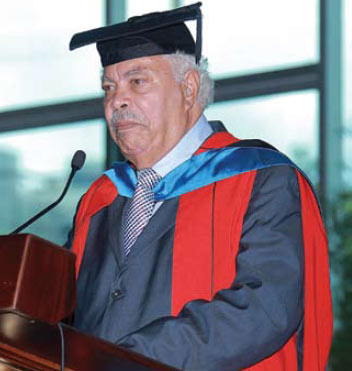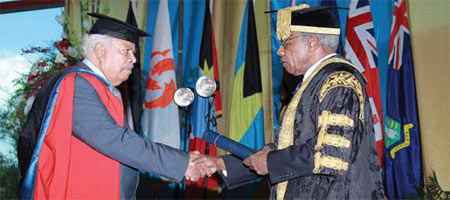 |
 |
 |
|
November 2011
|
HONORARY GRADUATE Scholars and scholarship in an ordered societySir Fenton Ramsahoye
Civilisation has had a long march. Its destination is still unknown as the march continues. Scholars and scholarship have been at its core. In every field of learning and experience scholars have been in the vanguard. The origins of education as we know it are not definitely known but it is clear that in the beginning men were self taught through experience which has passed into what we know and recognise as learning. Through the centuries learning has been passed down in various ways. Experience continues to enrich it. In educational historiography men have led but as the centuries passed the rise of scholarship among women became a clearly established feature of developing society. With every passing day the need for the advancement of learning grows. It is society’s greatest need because learning and experience are at the heart of progress in every field of human endeavour and yet the costs of education are rising. It is a sad reflection that teachers, upon whom we depend, are poorly paid. Technology is developing with the rise of scholarship and with it needs and expectations rise as well. Civilisation is served if rulers accept that the provision of education ought to be a public service because too few will have access if it is left in private hands. Limited access means loss of talent and this in turn hampers the aspirations for future development. Rulers are not often drawn from the world of scholars and scholarship but in an ordered society, rulers have the capacity to retain and reward the services of persons drawn from that world because of their control of the economic resources of the countries which they govern. The capacity to reward has inherent constraints because some societies are poor on account of limited resources but others are well endowed and can meet the demands which arise in meeting the costs of the intellectual and moral development of the population. Many will grasp the opportunities and will rise to distinction. From their world and the world of experience society will develop by the use of their talents. We marvel at the developments which have taken place in science and technology and in architecture to which we attribute many wonders of the world. It is all the result of patient and enduring scholarship. We have inherited legal systems by and through which we have been able to maintain peace and security and to advance the cause of justice because of the work of scholars during the past three thousand years or more. We speak of the rule of law. It is the basis of an ordered society in which rights and obligations are universally respected and enforced. Without it there can be no peace. Liberty and personal integrity will be endangered and respect for family life will diminish. There can be no progress in meeting peoples’ needs without the work of scholars and the contributions of scholarship as nations face a massive increase in the world’s population. Politicians speak of the unity of the people. That is an excellent concept in the search for consensus in a democratic society but the compulsive need is for scholars in every discipline to unite so that rulers who are dependent upon them for orderly government or democratic governance will listen to the force of their opinions. Perpendicular divisions between scholars and scholarship in the various disciplines cannot be in the public interest. There is a common interest among scholars to ensure that their contributions are collectively appreciated in the development of the population as a whole. Isolation as between scholars on one side and rulers on the other impedes national advance. It is the work of the scholars which promotes scientific, economic and social progress and the rule of law. Religion spread across the continents through the work of scholars. They have worked to sustain the ancient religions of India and China. Western Christendom developed through the work of men who developed the Canon Law even as Roman law led secular development and became the foundation of justice systems in Western Europe. Christianity had its disasters. In the Eastern Mediterranean, Islam destroyed all vestiges of Christianity and spread to North Africa and the Iberian peninsula. Spain became the battleground which marked off the division between Christendom and its enemies. Yet there is religious tolerance all over the world, which developed through the work of scholars who saw religious tolerance as an essential element of peace. In Western Europe, religion became the basis of political hegemony. Religious ideas were at the foundation of government. Today Christianity and the Hindu and Muslim religions are at the heart of our own culture. Charlemagne, a Frankish king, became King of the Romans in 800 AD. By then Christianity had already spread to Britain where the early Celts had a primitive Christianity before Pope Gregory the Great in the sixth century sent missionaries to England. We have learnt from German warrior nomads using small social and military groups, elements of government by consensus through the work of Tacitus a Roman scholar. Teutonic customs drawn from Frankish tribes were followed side by side with Roman law and have remained embedded in the legal systems of modern Europe. It is through scholars that we know our past and can make choices about our future. There were writings about the past in languages which have long passed away and are neither known nor spoken. But today we still learn from scholars whether in the languages they used they wrote from left to right or right to left or from top to bottom. Modern archaeology can often tell us what we were from artifacts which range from broken utensils to shopping lists long buried in the ground. This discipline, like science, continues to break new ground and is part of the wonders of scholarship. In the arts and literature we draw from historical data and the writings of those who make the intellectual landscape. This has been adorned by biblical studies drawing from the Old and New Testaments and by Greek and Latin classical studies which we call the humanities. Literature knows the nature poems of Wordsworth, natural selection propounded by Darwin, the class struggle involving the dictatorship of the proletariat in the works of Marx and the emotional conflicts within the self, mostly sexual, adumbrated by Freud. These works have contributed to the cultural development of the present day. Art remains the reflection of the modern environment as it did in the past. It speaks the same language across the continents. Human intellection requires the interpretation of writing in any form against the background of a physical environment and a mental universe which is not written.
The world’s population grows. Food and water are still unsatisfied needs in many parts of the world. Science and technology can work to satisfy these needs. The spread of information technology in a computer literate society will help communications as well as scientific advance with greater speed than it does now. Research in medicine and treatment will be advanced with the availability of increasing resources. Education is under-funded all over the world. It is to scholars that the world must look for change to increase investment in this vital area. Scholars can have influence if they unite to use it and to force the making of decisions which are in the interest of the world’s population. There should be neither vertical nor horizontal divisions among scholars. The place of scholarship in an ordered society is not in dispute. Real scholars have unblemished intellectual and moral integrity. Politicians too often suffer from severe character deficits. Scholars need to choose whether they will support corrupt rulers. Society’s misfortune is that some consciously or unconsciously aid and support cruel and vindictive tyrants. Many rulers are predisposed to plunder. A report about one who died recently is that he amassed assets exceeding two hundred billion dollars. He left many families in grief and they will continue to grieve for those they lost. Scholars who are united can force rulers to commit to peace and social justice and the end of war and plunder. They can compel the enlightened use of all national resources. Scholars must work against the evils which infest the globe so that light will be seen to shine at the end of life’s challenging tunnel. Praise be to the scholars. |

 Graduation in any discipline – be it civil or military – marks the dawn of a new day. It is the reward of effort and sacrifice. It is therefore appropriate that minds should be turned on this occasion towards the role of scholars and scholarship in an ordered society.
Graduation in any discipline – be it civil or military – marks the dawn of a new day. It is the reward of effort and sacrifice. It is therefore appropriate that minds should be turned on this occasion towards the role of scholars and scholarship in an ordered society. From time immemorial, man has known of war and peace. The production of armaments with their dreadful potential is the work of scientific scholarship. The decisions to make war are sometimes made on the advice of calculating scholars who see destruction of life and property as a means to some end. Persons in the world of scholarship are sometimes involved in the negotiations for peace but as between victor and vanquished there can be no equality of arms and the result of the peace may be further cause for yet more war and yet more negotiations for peace only after great damage has been done and life has been reduced by death and injury. Scholarship, upon which economic and social progress depends, is a coin the two different sides of which can be made to have functions which reverse each other. The need for higher levels of diplomacy has become pressing to avoid war and to ensure peace. Society accepts the need but the obstacles appear implacable because scholars are not united to force peace upon the world. Without them there can be no implements of war. Without the implements of war decision makers will be forced to commit to peace. Science will promote and will contribute to the works of peace time. Resources spent on wars will be differently spent to promote economic and social justice and basic human rights.
From time immemorial, man has known of war and peace. The production of armaments with their dreadful potential is the work of scientific scholarship. The decisions to make war are sometimes made on the advice of calculating scholars who see destruction of life and property as a means to some end. Persons in the world of scholarship are sometimes involved in the negotiations for peace but as between victor and vanquished there can be no equality of arms and the result of the peace may be further cause for yet more war and yet more negotiations for peace only after great damage has been done and life has been reduced by death and injury. Scholarship, upon which economic and social progress depends, is a coin the two different sides of which can be made to have functions which reverse each other. The need for higher levels of diplomacy has become pressing to avoid war and to ensure peace. Society accepts the need but the obstacles appear implacable because scholars are not united to force peace upon the world. Without them there can be no implements of war. Without the implements of war decision makers will be forced to commit to peace. Science will promote and will contribute to the works of peace time. Resources spent on wars will be differently spent to promote economic and social justice and basic human rights.